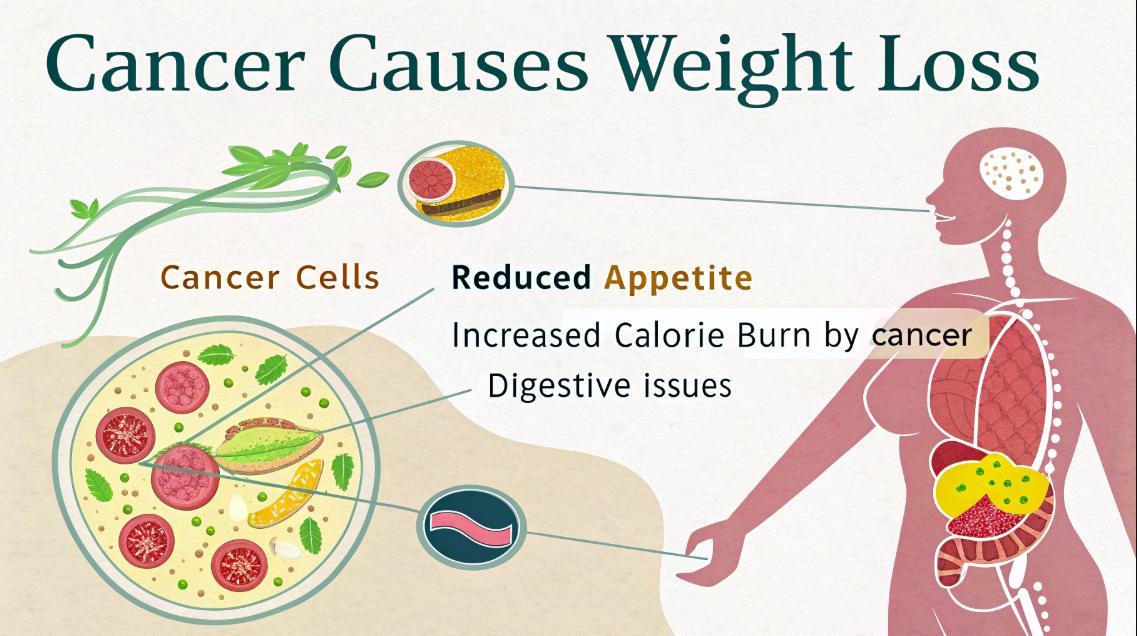Cancer is one of the most challenging health conditions worldwide, not only because of its impact on survival but also due to the significant changes it brings to a patient’s body. One of the most common yet often overlooked signs is unexplained weight loss. Many patients and their families wonder: why does cancer cause weight loss, and what does it mean for overall health?
Weight loss in cancer patients is not just about losing a few pounds—it can be a sign of deeper metabolic changes. Understanding the reasons behind it can help patients, caregivers, and healthcare providers identify cancer earlier, manage symptoms better, and improve quality of life.
Definition and Overview
Unintentional weight loss is defined as losing more than 5% of body weight within six to twelve months without actively trying to diet or exercise. In cancer, this happens because the disease alters how the body uses nutrients, leading to a condition called cancer cachexia. Cachexia is characterized by muscle wasting, fatigue, and reduced appetite, making weight loss one of the hallmark signs of cancer.
Types
Different types of cancers can cause varying degrees of weight loss.
- Gastrointestinal cancers (stomach, esophagus, pancreas, liver, colon) often cause early and severe weight loss due to problems with digestion and nutrient absorption.
- Lung cancer frequently leads to appetite loss and increased energy expenditure.
- Blood cancers (leukemia, lymphoma) may cause weight loss through systemic inflammation.
- Advanced-stage cancers of almost any type often trigger severe cachexia.
Causes and Risk Factors
There are several reasons why cancer causes weight loss:
- Increased metabolism – Cancer cells consume large amounts of energy, leading to higher calorie burning.
- Inflammation – Tumors release chemicals (cytokines) that alter metabolism and suppress appetite.
- Digestive disruption – Tumors in the digestive tract can block food absorption or cause pain during eating.
- Treatment side effects – Chemotherapy and radiation often cause nausea, vomiting, or loss of appetite.
- Psychological stress – Anxiety and depression related to cancer can also reduce appetite.
Symptoms and Early Warning Signs
In addition to weight loss, other symptoms may include:
- Persistent fatigue
- Loss of appetite
- Night sweats or fever
- Pain or discomfort during digestion
- Swelling or lumps in the body
- Changes in bowel habits
These symptoms, especially when paired with unexplained weight loss, should not be ignored and warrant medical attention.
Diagnosis
Doctors use a combination of medical history, physical exams, imaging tests (CT, MRI, PET scans), blood tests, and biopsies to determine the cause of weight loss and confirm cancer. Identifying cachexia early can help in better treatment planning and nutritional support.
Treatment Options
Managing weight loss in cancer involves treating both the cancer itself and its effects on the body:
- Cancer treatment: surgery, chemotherapy, immunotherapy, or radiation to target tumors.
- Nutritional therapy: high-calorie, protein-rich diets, and supplements.
- Medications: appetite stimulants, anti-nausea drugs, and anti-inflammatory medicines.
- Exercise programs: light physical activity to preserve muscle mass.
Prevention and Lifestyle Recommendations
While not all cancer-related weight loss can be prevented, certain lifestyle practices may reduce risks:
- Eating a balanced diet rich in fruits, vegetables, lean proteins, and whole grains.
- Avoiding tobacco and limiting alcohol.
- Engaging in regular exercise to maintain muscle strength.
- Attending regular health screenings for early detection.
Prognosis and Survival Rates
Unexplained weight loss can signal advanced disease and may affect prognosis. Patients with severe cachexia often face more complications during treatment. However, early detection of weight loss and timely intervention can improve treatment outcomes and enhance survival rates.
Latest Research and Innovations
Ongoing studies are exploring how cancer alters metabolism at the molecular level. New therapies targeting cachexia, such as anti-inflammatory drugs and metabolic regulators, are showing promise. Researchers are also developing advanced nutritional interventions to help patients maintain weight and strength during treatment.
Coping and Support for Patients
Weight loss can be emotionally distressing, especially when it alters physical appearance and energy levels. Support strategies include:
- Working with a dietitian for personalized meal planning.
- Joining cancer support groups to share experiences.
- Seeking mental health counseling to manage stress and depression.
- Involving family members in nutritional and emotional support.
Conclusion
Unexplained weight loss is a significant warning sign that should never be ignored. Understanding why cancer causes weight loss allows patients and caregivers to take proactive steps in seeking medical advice, improving nutrition, and managing overall health. Early intervention not only improves quality of life but also supports better treatment outcomes.
FAQ
1. Why does cancer cause weight loss even if I eat normally?
Because cancer cells alter metabolism and cause the body to burn calories faster while reducing nutrient absorption.
2. Is weight loss always a sign of cancer?
No. It can also be caused by thyroid disorders, infections, digestive diseases, or stress. However, unexplained weight loss should always be checked by a doctor.
3. How much weight loss is considered serious?
Losing more than 5% of body weight within six months without trying is considered a red flag.
4. Can cancer-related weight loss be reversed?
Yes, with nutritional support, medications, and effective cancer treatment, weight stabilization and even weight gain are possible.
5. When should I see a doctor?
If you experience unexplained weight loss, especially along with fatigue, pain, or digestive issues, seek medical attention promptly.

